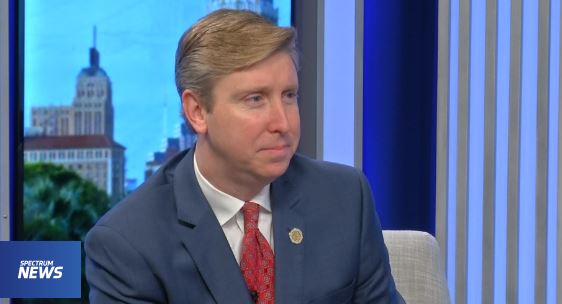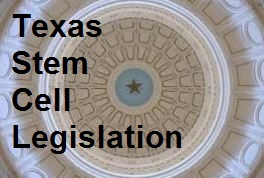Austin, TX – May 20th, 2018 Elizabeth Jeneault, host of “In Focus” on Spectrum News, interviewed the people behind the passage of historic legislation that is changing the face of medicine, by putting patient’s rights first.
Patients For Stem Cells, founding members Jennifer Ziegler and Tracy Thompson
Click to watch interview

Jennifer and Tracy share how their advocacy work over many years led to passage of Charlie’s Law, Texas HB 810, that was signed into law in 2018. This law will allow adult stem cell treatment in Texas for terminal and critically ill chronic patients.
Rep. Tan Parker on Charlie’s Law, TX HB 810 Stem cell Law
Click to watch interview

State Rep. Tan Parker (R), author of Charlie’s Law, explains why he’s passionate about allowing adults to access their own stem cells for helpful health treatments.
KK125 Ovarian Cancer Research Foundation on Right To Try
Click to watch interview

Michelle Wittenburg, President of The KK125 Ovarian Cancer Research Foundation discusses how a personal loss drove her to advocate for adult stem cell therapy, and other beneficial ovarian cancer treatments utilizing the Texas Right To Try law.
Ten days after these interviews were given, the federal Right to Try Act was signed into law on May 30th, 2018. President Trump Signs Right to Try Act Into Law.
FAQ
What started the Texas movement?
The advocacy efforts started in 2007 in Texas. At that time, Patients for Stem Cells (PFSC) was not in existence. Two women who would later become founding members of PFSC were active at the state level in advocacy and helped educate on the promise adult stem cells hold. By 2011 after much education and visibility at the state capitol an effort was led by then State Representative Rick Hardcastle. Chairman Hardcastle lost his daughter at the age of 17 to cancer and shortly after he was diagnosed with MS. Due to Chairman Hardcastle’s efforts and two of the founding members of PFSC, a clinic opened in Houston to treat patients with expanded stem cells. Governor Rick Perry was the first patient and Chairman Rick Hardcastle was patient number 5. Founding members of PFSC were also treated. However, this was short lived. The FDA ruled in Sept. 2012 that expanded stem cells were a drug, subject to the lengthy FDA approval process. This required the clinic to cease treating patients in the U.S. One of us was mid-treatment when this occurred. Having worked for years to gain access to this treatment in the U.S. and then have hopes crushed was devastating. This is what inspired the formation of PFSC in Oct. 2012, building on the effort that started over a decade ago, and has now expanded to a nationwide network. This has been an effort in the making for over a decade, culminating in two significant pieces of Texas legislation, The Right To Try Act in 2015, and TX HB 810, Charlie’s Law in 2017.
We want to thank Chairman Hardcastle, Chairman Tan Parker, the bill author, State Representative Drew Springer, co-sponsor, and State Senator Paul Bettencourt for sponsoring the Senate version. They were great champions in passing HB 810 with unanimous bipartisan approval.
We are forever grateful to so many people that made this a reality. The dedication and compassion was overwhelming. This is something that can be done by every state in our nation.
What’s the difference between Right To Try Laws and Texas HB 810?
Since 2014, 40 states have passed Right To Try laws. The Right To Try law gives terminal patients the right to try experimental drugs or biologics. The success at the state level was the driving force in passing the federal law in 2018.
Texas HB 810 extends this right to chronically ill patients, but only for biologics, like adult stem cell treatments. We support regulation and want accountability within the industry. However, this should fall under the practice of medicine and is something that can be regulated at the state level. HB 810 is not perfect, but it is a starting point. We will continue to work to improve this and do it in a responsible way, offering a safe and regulated environment.
Can I get stem cell therapy in Texas now?
No, not yet. HB 810 went into effect in Sept. 2017. However, it had to go before 2 state agencies to define regulations. The first step was for the Texas Medical Board to do their rule making process. It is now before the Texas State Department of Health and Human Services to establish which conditions can be treated. This decision is expected in the fall of 2018. We will publish when this is available. Until that time, there are no clinics operating under HB 810.
So why do I see many clinics in Texas and other states offering stem cell therapy?
These are clinics offering low dose stem cell therapy, that is extracted from adipose tissue and then infused into the patient on the same day. These clinics are all operating outside of FDA guidelines and are subject to enforcement at any time as we have seen with the recent injunctions against Cell Surgical Network and US Stem Cell Clinic. These were two of the largest and most visible nationwide networks offering same day cell procedures for a myriad of diseases. There are about 600 clinics offering treatments and the vast majority are doing so outside of guidelines. This is NOT the same therapy as expanded high dose stem cells. If a same-day clinic says they are operating under Right To Try or TX HB 810, they are being misleading. The exception to this is same-day orthopedic treatments using bone marrow derived stem cells, which is still allowed under the FDA’s regulations.
Will patients have to pay to be in these trials?
At this time the cancer treatments are being paid for by the patient, and it is expected the expanded stem cell therapies will also be paid for by the patient. The benefit to patients is that they no longer have to incur the extra expense or inconvenience of offshore travel. Offshore travel is not even possible for many patients who are very sick, so by bringing the treatments back to the U.S. it removes one more barrier.
When will the treatments given under TX HB 810 and Right To Try be covered by insurance?
None of these therapies are covered by insurance at this time. The treatments likely will have to continue through the FDA approval process. However, in 2017 the momentum created by Right To Try laws being passed in many states, as well as patient activism, the 21st Century Cures Act was signed into law. This Act provides the FDA with the flexibility to accelerate how it evaluates regenerative medicine treatments, such as stem cell therapies.. It is possible that the data generated from the trials in Texas may be used in this process, and help gain faster FDA approval, the prerequisite to insurance coverage.
What type of cancers are being treated under the Right To Try law in Texas?
The Texas Right to Try law went into effect in June 2015, since then at least 78 patients have received an experimental cancer treatment not allowed by the FDA for Neuroendocrine Tumors. Dr. Ebrahim Delpassand is conducting a trial at Excel Diagnostics & Nuclear Oncology Center in Houston TX. Click HERE for information on the therapy, and contact information.
Also see Who’s Actually Using ‘Right-To-Try’ Laws? A Texas Oncologist Explains his Experience
Also see Right To Try Is Working
For information on ovarian cancer, contact The KK125 Ovarian Cancer Research Foundation
What can we do as patients?
The power of the patient voice is gaining momentum. This has been a landmark year for patients. The federal passage of Right To Try and the first ever state law allowing expanded adult stem cell treatments for chronic/terminal patients is so exciting. We see great potential moving forward, and are already working with other states to implement the model that was passed in TX. Every state needs passionate, educated advocates to put a face to the issue and make it a reality. There is so much power in patient advocacy. However, we must craft a very positive effective message. It’s about protecting our constitutional right to self-preservation in the face of chronic/terminal illness. We must remain bi-partisan and work together to take this movement to the next level. We feel this model will be the next phase of Right To Try and we want it now rather than later.
Telling your personal story and getting involved can be intimidating. Never underestimate the power of the patient’s voice. There were many times we felt inferior during this process. It can be very emotional to put yourself out there. It is all well worth it when you hear from the legislators that personal stories are what make bills into laws. It takes putting a face to the bill that brings it to life. The moral of the story is never underestimate the value you can bring. Some of us are not physically able to be there in person, but can still contact their law makers via phone and email.
Our subscribers to the PFSC blog have been an amazing support to us when we’ve made a call to action, contacting their legislators and regulators. Please continue to share our posts far and wide to get the message of hope out there to all patients. Thank you to each and every one of you!
Want to get involved in your state? Please contact us!
Join the conversation with other patients on our Facebook page and Twitter.
The Patients For Stem Cell Team

 UPDATE June 2017 THANK YOU to everyone who wrote and called the Texas Legislature! HB810 Charlie’s Law was signed by Gov. Greg Abbott. The Texas Board of Health will define rules starting in Oct. 2017. Here is a news report as of Sept. 25, 2017
UPDATE June 2017 THANK YOU to everyone who wrote and called the Texas Legislature! HB810 Charlie’s Law was signed by Gov. Greg Abbott. The Texas Board of Health will define rules starting in Oct. 2017. Here is a news report as of Sept. 25, 2017 